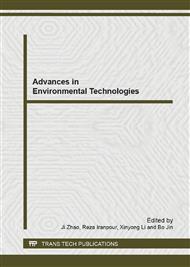p.325
p.331
p.340
p.344
p.348
p.357
p.363
p.368
p.373
Enantioselective Degradation of Tebuconazole in Wheat and Soil under Open Field Conditions
Abstract:
This study assesses enantioselectivity on the degradation of tebuconazole in wheat grain, straw, and soil in Beijing and Zhejiang under open field conditions. After agricultural application, the analytes were extracted from soil and grain with acetonitrile, and from straw with acetonitrile containing 1% acetic acid through ultrasonic extraction. The extracts were cleaned by dispersive-solid phase extraction, and determined by chiral liquid chromatography-tandem mass spectrometry with a Lux amylose-2 column. The results of field trials indicated that the degradation of tebuconazole enantiomers followed first-order kinetics in straw and soil at the two sites. Their half-lives in straw ranged from 3.88 to 4.93 days, which were shorter than those in soil ranging from 40.76 to 43.86 days. The (-)-tebuconazole showed faster degradation in straw from Beijing and Zhejiang. In Zhejiang soil, preferential degradation of (+)-tebuconazole was observed, whereas (-)-tebuconazole was preferential in Beijing soil. The terminal residues of (-)-tebuconazole in most grains were higher than those of its antipode, indicating significant enantioselective residues.
Info:
Periodical:
Pages:
348-356
Citation:
Online since:
August 2013
Authors:
Keywords:
Price:
Сopyright:
© 2013 Trans Tech Publications Ltd. All Rights Reserved
Share:
Citation:


